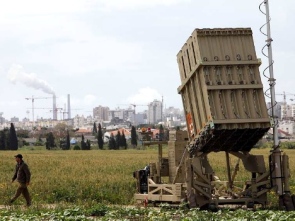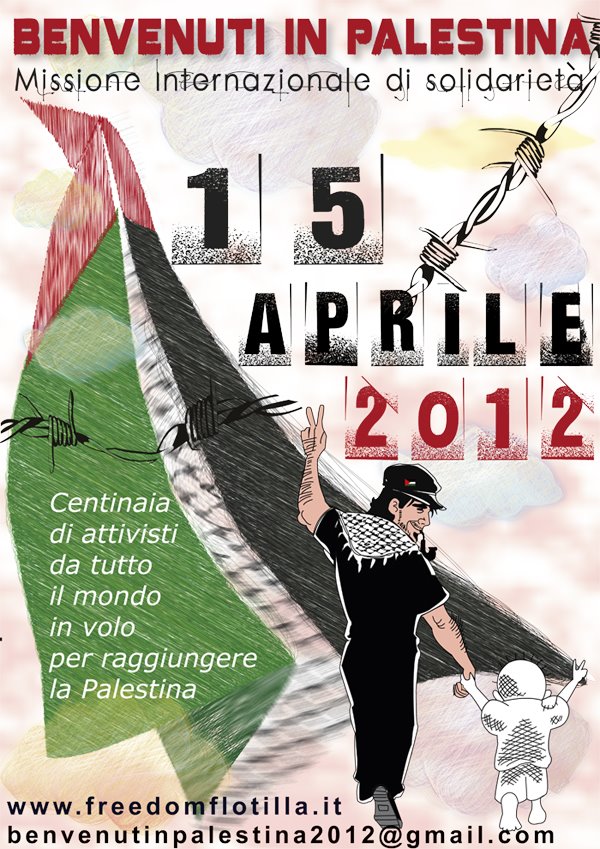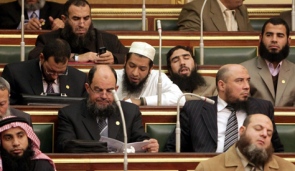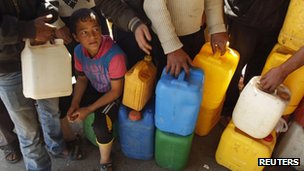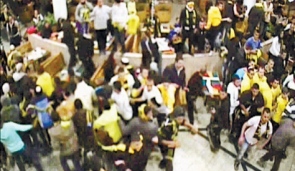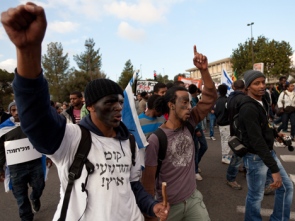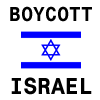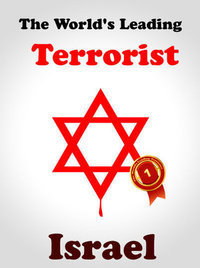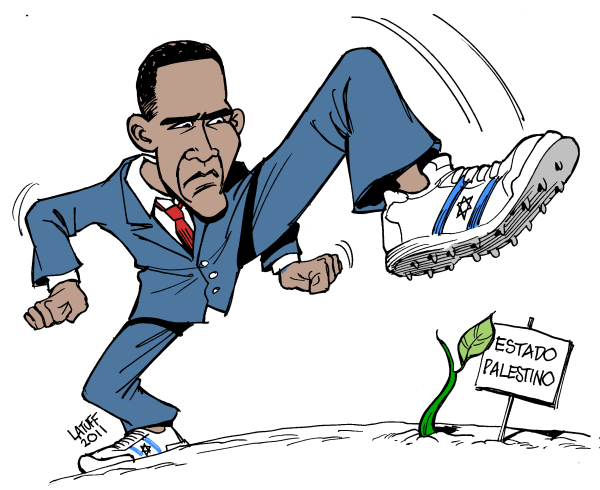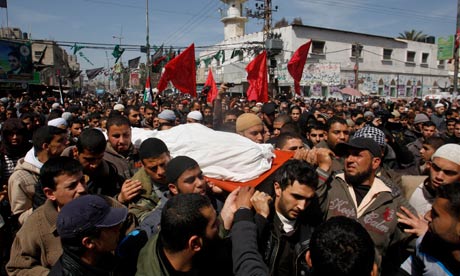Today is Land Day in Palestine, with hundreds of activities planned –
follow the news channels for updates!
EDITOR: The deep friendship between Islamophobia and Philo-Zionism
Anne Karpf, in an excellent piece in the Guardian, is incisive about this new-found love between Euro Neonazis and Zionism, a friendship deeply rooted in their common hatred of Islam and the Arab world, and their shared innate racism. The ruling parties of Europe, all right wing and market-oriented, are not far behind, of course, as Sarkozy, Cameron and Berlusconi have proven time and again. Israel has carefully honed Islamophobia, orientalist racism and the myth of Arabs as terrorists, until it became the leading ideology of the west. We ignore this at our peril.
Don’t be fooled. Europe’s far-right racists are not discerning: Guardian
Opportunistic words of love for Jews and Israel cannot disguise the European far right’s toxic rhetoric of hatred
Anne Karpf
guardian.co.uk, Tuesday 27 March 2012 19.30 BST
On Saturday, in the Danish city of Aarhus, a Europe-wide rally organised by the English Defence League will try to set up a European anti-Muslim movement. For Europe’s far-right parties the rally, coming so soon after the murders in south-west France by a self-professed al-Qaida-following Muslim, marks a moment rich with potential political capital.

Yet it’s also a delicate one, especially for Marine Le Pen. Well before the killings, Le Pen was assiduously courting Jews, even while her father and founder of the National Front, Jean-Marie Le Pen, was last month convicted of contesting crimes against humanity for saying that the Nazi occupation of France “wasn’t particularly inhumane”. Marine must disassociate herself from such sentiments without repudiating her father personally or alienating his supporters. To do so she’s laced her oft-expressed Islamophobia (parts of France, she’s said, are suffering a kind of Muslim “occupation”) with a newfound “philozionism” (love of Zionism), which has extended even to hobnobbing with Israel’s UN ambassador.
Almost all European far-right parties have come up with the same toxic cocktail. The Dutch MP Geert Wilders, leader of the anti-immigrant Freedom party, has compared the Qur’an to Mein Kampf. In Tel Aviv in 2010, he declared that “Islam threatens not only Israel, Islam threatens the whole world. If Jerusalem falls today, Athens and Rome, Amsterdam and Paris will fall tomorrow.”
Meanwhile Filip Dewinter, leader of Belgium’s Vlaams Belang party, which grew out of the Vlaams Blok Flemish nationalist party, many of whose members collaborated with the Nazis during the second world war, has proposed a quota on the number of young Belgian-born Muslims allowed in public swimming pools. Dewinter calls Judaism “a pillar of European society”, yet associates with antisemites, while claiming that “multi-culture … like Aids weakens the resistance of the European body”, and “Islamophobia is a duty”.
But the most rabidly Islamophobic European philozionist is Heinz-Christian Strache, head of the Austrian Freedom party, who compared foreigners to harmful insects and consorts with neo-Nazis. And yet where do we find Strache in December 2010? In Jerusalem alongside Dewinter, supporting Israel’s right to defend itself.
In Scandinavia the anti-immigrant Danish People’s party is a vocal supporter of Israel. And Siv Jensen, leader of the Norwegian Progress party and staunch supporter of Israel, has warned of the stealthy Islamicisation of Norway.
In Britain EDL leader Tommy Robinson, in his first public speech, sported a star of David. At anti-immigrant rallies, EDL banners read: “There is no place for Fascist Islamic Jew Haters in England”.
So has the Jew, that fabled rootless cosmopolitan, now suddenly become the embodiment of European culture, the “us” against which the Muslim can be cast as “them”? It’s not so simple. For a start, “traditional” antisemitism hasn’t exactly evaporated. Look at Hungary, whose ultra-nationalist Jobbik party is unapologetically Holocaust-denying, or Lithuania, where revisionist MPs claim that the Jews were as responsible as the Nazis for the second world war.
What’s more, the “philosemite”, who professes to love Jews and attributes superior intelligence and culture to them, is often (though not always) another incarnation of the antisemite, who projects negative qualities on to them: both see “the Jew” as a unified racial category. Beneath the admiring surface, philozionism isn’t really an appreciation of Jewish culture but rather the opportunistic endorsement of Israeli nationalism and power.
Indeed you can blithely sign up to both antisemitism and philozionism. Norwegian mass murderer Anders Behring Breivik described himself as “pro-Zionist” while claiming that Europe has a “considerable Jewish problem”; he saw himself as simultaneously anti-Nazi and pro-monoculturalism. The British National party’s Nick Griffin once called the Holocaust the “Holohoax”, subsequently supported Israel in its war “against the terrorists”, but the day after the Oslo murders tweeted disparagingly that Breivik was a “Zionist”.
Most Jews, apart from the Israeli right wing, aren’t fooled. They see the whole iconography of Nazism – vermin and foreign bodies, infectious diseases and alien values – pressed into service once again, but this time directed at Muslims. They understand that “my enemy’s enemy” can easily mutate into “with friends like these …”.
The philozionism of European nationalist parties has been scrutinised most closely by Adar Primor, the foreign editor of Haaretz newspaper, who insists that “they have not genuinely cast off their spiritual DNA, and … aren’t looking for anything except for Jewish absolution that will bring them closer to political power.”
Similarly Dave Rich, spokesman of the Community Security Trust (CST), which monitors antisemitic incidents in Britain, told me that far-right philosemites “must think we’re pretty stupid if they think we’ll get taken in by that. The moment their perceived political gain disappears they revert to type. We completely reject their idea that they hate Muslims so they like Jews. What targets one community at one time can very easily move on to target another community if the climate changes.” Rich’s words, spoken before the murder of Jews in Toulouse, now sound chillingly prescient. The president of the French Jewish community, Richard Pasquier, judges Marine Le Pen more dangerous than her father.
French Muslim leaders rallied round Jewish communities last week. Next week sees the start of Passover, a festival celebrating the liberation of Jews from slavery in Egypt, when Jews often think about modern examples of oppression. Let’s hope that French Jewish leaders use the occasion to rally round Muslim communities, and to remember that ultimately, racism is indiscriminate.
Islamophobia as a political ploy: Guardian CoF
The fixation with diagnosing Islam’s ills may mask deeper anxieties about upheavals in European and American societies
Usman Ahmedani
guardian.co.uk, Thursday 29 March 2012
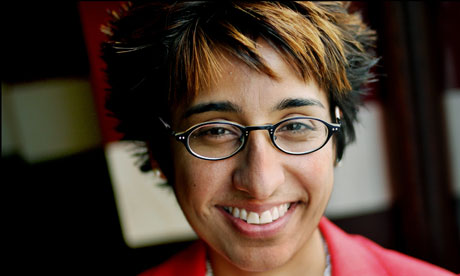
Consider the case of a controversial cartoon. Not the notorious Danish cartoons, but a cartoon published in the New York Post last month. A response to revelations that emerged in February about the NYPD’s large-scale spying on American Muslim students after 9/11, it portrayed three hook-nosed, turbaned terrorists complaining that the police were spying on them. In doing so, it insinuated a link between the terrorists the NYPD is meant to monitor and the innocent American citizens whose civil liberties were deliberately breached.
I was reminded of this cartoon during Irshad Manji’s recent talk at a Free Speech Debate event at Oxford University. Manji opposes all legal prohibitions on free speech, even to the point of permitting the publication of death threats against herself. While certainly idiosyncratic, this position is internally consistent, avoiding the hypocrisy that habitually bedevils attempts to ban certain types of free speech on the grounds of offence but not others. However, once we accept that the state should not play the role of censor, an absolutist defence of free speech as “life itself”, as Salman Rushdie once put it, cannot tell us how to judge between individual instances of its exercise.
Looking at a cartoon that portrays American Muslims as terrorists-to-be from the perspective of free speech versus censorship alone absolves us from asking what the intention behind it is, or what context it appears in. The context in this case is one of increasing Islamophobia in Europe and North America, from the furore caused by proposals for a mosque in Manhattan to the fact that provision of halal meat has become a defining issue in the French presidential campaign.
The depiction of Muslims in the New York Post as hook-nosed Semites is no coincidence, sharing much in common with the anti-Jewish stereotypes widely prevalent not so long ago, when attacks on Jews as people masqueraded as critiques of their religious practices. This makes it difficult to uphold a classical liberal distinction between criticising “beliefs” and criticising “people”, for the two are conflated in the racialised manner in which Muslims are often discussed.
Nor is this a simple matter of isolating the far right, for anti-Muslim animus can unite liberals and conservatives, as demonstrated by the Danish cartoon controversy. For the right, Muslims are to be excluded for not fitting into a Christian conception of the west; for sections of the left, because Islam is regarded as alien to a secular Enlightenment defined as European in origin.
While they differ over the character of their preferred “reformist Islam”, both Manji and the Islamists she castigates are on shared ground in assuming that the trouble lies in one interpretation of Islam and that the solution lies in another. But in fact the problem lies in framing this as a discussion about Islam as a religion to begin with, as happens in the never-ending debates about the compatibility of Islam with liberalism, democracy, or free speech. Such a framing puts the burden on a minority to prove its compatibility with the prejudices of a majority. This perpetuates the tendency, among both Muslims and non-Muslims, to think of Muslims as Muslims first and alone, rather than treating their concerns as those of any other citizen, for whom religion is one marker among many, including class and ethnicity.
“Moderate Muslims,” Manji writes in Allah, Liberty and Love, “are so consumed with western colonialism that they’ve diverted themselves from dealing with the imperialists inside Islam.” Yet the existence of Muslims who use accusations of Islamophobia as a political ploy to shut down dissent within Muslim communities does not make the reality of Islamophobia irrelevant. After all, antisemitism is no less real just because it has been exploited as a smear with which to silence critics of Israel. Muslims and non-Muslims alike have always engaged critically and creatively with the Islamic tradition, both reverently and irreverently.
Their right to do so must be beyond question. However, criticism of religion does not exist in a vacuum of ideas, abstracted from any wider political context. In this vein, it is worth asking what function the disproportionate fixation with diagnosing Islam’s ills fulfils in much of Europe and North America today. Could this too be a political ploy, to disguise and displace deeper anxieties about the direction our societies are taking at a time of immense political and economic upheaval?
Jerusalem is at the heart of the Palestinian struggle: Guardian CoF
The traditional centre of Palestinian social, religious and economic life is increasingly being isolated by Israeli policies
Sarah Colborne
guardian.co.uk, Tuesday 27 March 2012
Jerusalem is a city that embodies the cultural heritage of three religions: Islam, Christianity, and Judaism. Yet Palestinians – both Christian and Muslim – are being driven out of Jerusalem. Just one example of this ethnic cleansing is taking place in Silwan, where 1,000 residents are facing imminent eviction as their homes make way for the King David tourist park. In response to the urgency of the situation, an international alliance is mounting a series of peaceful protests worldwide on 30 March to call for an end to the ethnic cleansing of Palestinians living in Jerusalem.
Jerusalem, the traditional centre of Palestinian social, religious and economic life, is increasingly being isolated and restricted by Israeli policies. As the Israeli human rights organisation B’Tselem points out, ever since Israel illegally occupied East Jerusalem in 1967, in violation of international law, “the government of Israel’s primary goal in Jerusalem has been to create a demographic and geographic situation that will thwart any future attempt to challenge Israeli sovereignty over the city”. Some 200,000 settlers now live in illegal Israeli settlements in East Jerusalem.
Concern over these policies is not limited to pro-Palestinian activists, or Israeli human rights groups. An EU Heads of Mission report last year highlighted the continued expansion of illegal Israeli settlements, evictions and demolitions of Palestinian homes, and restrictions on legal and religious freedoms. Palestinians who have lived for generations in East Jerusalem can lose their residency rights if they leave the city because of a Kafkaesque notion that the centre of their life is no longer in Jerusalem, while Israeli citizens retain guaranteed citizenship. Since Israel’s occupation of East Jerusalem, more than 14,000 Palestinians have had their residency rights revoked. The 270,000 Palestinians living in East Jerusalem can find themselves ordered to demolish their homes or businesses, or being forced to watch whilst settlers take over their homes. It is estimated that 20,000 Palestinian homes in Jerusalem have been issued with demolition orders.
Despite Israel’s violations of international law, and the Fourth Geneva Convention – designed to protect those living under occupation – governments have failed to prevent Israel’s violations of international law, which is why it is so vital that international civil society is acting.
The Global March to Jerusalem is bringing together an impressive coalition of Palestinian voices and organisations, with supporters from dozens of countries around the world travelling to Jerusalem, and to the border countries, to participate in the peaceful actions, or organising protests in London and other cities around the world. Two Nobel laureates, Archbishop Desmond Tutu and Mairead Maguire, have joined the international endorsers. Other members of the advisory board include Mustafa Barghouti, Rabbi Lynn Gottlieb, author and activist in the Jewish Renewal movement; and Ronnie Kasrils, the South African national liberation leader and former cabinet minister.
The struggle for freedom, peace and justice for Palestinians is a key issue for those of us committed to equality and human rights. I grew up during the era of apartheid in South Africa, and saw the potential for us all to successfully oppose injustice. This was why I sailed on the Mavi Marmara, in a flotilla with participants from over 40 countries, attempting to break Israel’s siege on Gaza. The struggle for Palestinian rights is at the core of the global movement for social and economic justice, for liberation, for equality, and against racism. The Global March to Jerusalem is continuing in that tradition, organising a nonviolent response to Israel’s violations of international law.

